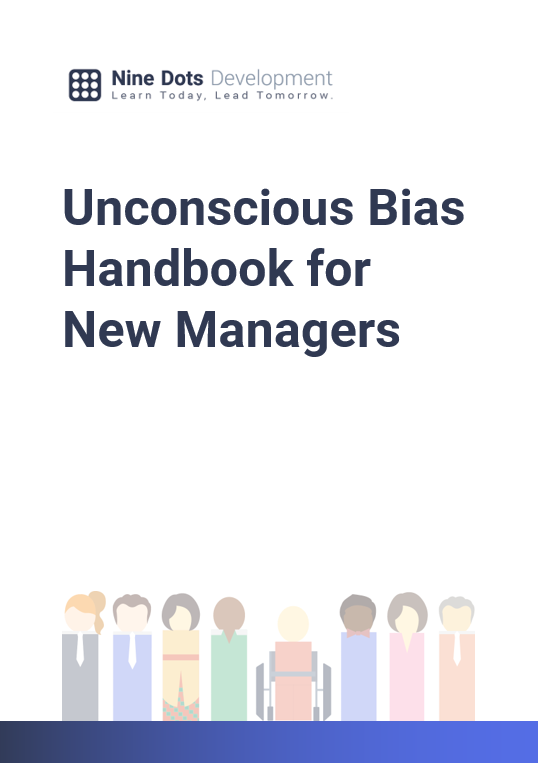Monday 05 Jun 2023 Article
The TakeawayNavigating People Manager Responsibilities as a New Manager
How to Overcome the Trials and Tribulations of First-time Management
Part 12
#HRResponsibilitiesOfANewManager #ThePurposeOfHRPoliciesAndProcedures #ED&I #DisciplinariesAndGrievances #ManagingAbsence #ProactiveAndPreventativeManagementOfIssues
The perfectly matched resource for this article...
Unconscious Bias Handbook for New Managers
As you embark on the journey of becoming a manager for the first time, it is crucial to recognise the impact of unconscious bias in the workplace. Unconscious biases are implicit attitudes or stereotypes that affect our judgment and decision-making processes without us even realizing it. As a manager, it is essential to be aware of these biases to create an inclusive and equitable work environment. This guide aims to raise your awareness of unconscious bias and provide strategies for mitigating its effects.
Download!Playing catchup?
Navigating People Manager Responsibilities as a New Manager
As a new manager, taking on human resources (HR) responsibilities is a crucial aspect of your role. These responsibilities encompass various areas, including HR policies and procedures, ensuring equality, diversity, and inclusion (ED&I), handling disciplinaries and grievances, managing absence, and proactively addressing issues. In this article, we will explore these key topics, shedding light on essential people manager responsibilities and providing insights into effective management strategies.
Types of HR Responsibilities of a New Manager
As a new manager, you will encounter a range of HR responsibilities that contribute to the smooth functioning of your team and the organisation as a whole. These responsibilities can include recruitment and selection, onboarding and training, performance management, employee development, compensation and benefits, and employee relations. Understanding these areas of HR enables you to navigate your role as a people manager effectively, ensuring the success and well-being of your team members.

The Purpose of HR Policies and Procedures
HR policies and procedures serve as guiding principles for consistent and fair treatment of employees. They outline the organisation's expectations, standards, and practices in various areas, such as employee conduct, performance management, leave policies, and anti-discrimination measures. These policies and procedures promote transparency, mitigate risks, ensure compliance with legal requirements, and contribute to a positive work environment. As a people manager, it is essential to familiarise yourself with these policies and effectively communicate them to your team.
ED&I
Equality, diversity, and inclusion (ED&I) are fundamental principles in contemporary workplaces. As a people manager, it is your responsibility to foster a culture that embraces diversity and promotes inclusivity. This involves creating equal opportunities for all employees, valuing and respecting individual differences, challenging biases and stereotypes, and implementing policies and initiatives that promote diversity and inclusivity. By actively promoting ED&I, you create a more engaged and innovative workforce that can contribute to the organisation's success.

Disciplinaries and Grievances
Dealing with disciplinaries and grievances is an integral part of a people manager's responsibilities. Disciplinaries involve addressing employee misconduct or performance issues through a fair and objective process. Grievances, on the other hand, relate to employee complaints or concerns about their work environment, treatment, or other workplace issues. As a people manager, you must handle these situations promptly and fairly, following established procedures, conducting thorough investigations, and ensuring open lines of communication. Handling disciplinaries and grievances effectively promotes a culture of trust, fairness, and accountability within the team.
Managing Absence
Managing employee absence is another critical aspect of people management. This includes monitoring and recording absences, addressing patterns of absence, conducting return-to-work discussions, and implementing appropriate measures to support employee well-being. By proactively managing absence, you can minimise the impact on team productivity, address underlying issues, and support employees in maintaining a healthy work-life balance. Open and empathetic communication is crucial in these situations, ensuring employees feel supported while also maintaining operational efficiency.

Proactive and Preventative Management of Issues
As a people manager, it is essential to adopt a proactive and preventative approach to managing issues. This involves identifying and addressing potential challenges before they escalate into significant problems. This can include implementing regular performance discussions, providing ongoing feedback and coaching, conducting team-building activities, promoting a positive work culture, and addressing conflicts in a timely manner. By taking proactive measures, you can create a harmonious and productive work environment, fostering strong relationships and preventing issues from negatively impacting team dynamics.
Conclusion
In conclusion, embracing your people manager responsibilities with diligence and care allows you to create an environment where employees feel valued, supported, and empowered. By prioritising HR policies and procedures, promoting ED&I, effectively managing disciplinaries and grievances, handling absence, and proactively addressing issues, you lay the foundation for a thriving and high-performing team. Your commitment to effective people management contributes to the success of both individual employees and the organisation as a whole.
Unconscious Bias Handbook for New Managers
As you embark on the journey of becoming a manager for the first time, it is crucial to recognise the impact of unconscious bias in the workplace. Unconscious biases are implicit attitudes or stereotypes that affect our judgment and decision-making processes without us even realizing it. As a manager, it is essential to be aware of these biases to create an inclusive and equitable work environment. This guide aims to raise your awareness of unconscious bias and provide strategies for mitigating its effects.
Download!Missed an article?
More from How to Overcome the Trials and Tribulations of First-time Management
